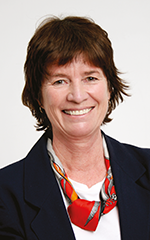

In the afterglow of the Olympics, my most enduring memory is the men’s 100-metre finals where the top four were separated by three hundredths of a second; and Noah Lyles beat Kishane Thompson by four thousandths of a second, while the entire field was separated by 12 hundredths of a second, and would have earned a medal in every previous Olympics. The implications for these incredible athletes with respect to recognition is huge. These random numbers are the difference between being ‘just’ a world-class sprinter and a superstar.
This made me start thinking about numbers and their importance. For example, what are the random numbers that run our lives? The first thing that came to mind was gaming. One of the first (and few) programs I ever wrote was a program to play roulette. I was really proud of it and brought it out for a wine-filled student evening. It needed a random number generator, and my trusty 64K Apple had a command to do this. At the time I totally believed that this was truly random. Some further investigation has now taken me into the fascinating world of random numbers – gaming is only a tiny part of it – and randomness is not what I thought.
It’s a critical component of things in our daily lives that we take for granted – like protecting our passwords, forecasting weather patterns, predicting trends in financial markets, modelling the spread of diseases (a bit close to home for most of us), improving the performance of large language models, optimisation of automation processes, and a whole lot more.
So what exactly is a random number? It’s a value that is unpredictable and lacks any discernible pattern. In maths, random numbers must have no bias toward any value. Surprisingly true randomness is incredibly difficult to achieve in the digital world. Computers, by their nature, follow specific instructions. The problem is that they rely on internal mechanisms that are predictable, so the outputs of their algorithms eventually become predictable too.
If computers can’t generate true randomness, what can? Researchers look for chaotic physical phenomena that can’t be predicted or manipulated, like the noise of an electrical storm or pictures of raindrops on glass. If you need some random numbers, the website random.org is one of the best-known places to look. It relies on high-quality atmospheric noise from nine large radio receivers worldwide.
Another promising source for generating true random numbers to secure information is the unpredictable motion of the oily blobs in a lava lamp. Yet another is based on bubbles in a fishtank; and another group of researchers found randomness in the unique genetic sequences in DNA molecules.
The latest thinking is that the best random number generator (RNG) relies on quantum mechanics effects. These are as random as it gets. For example, the behaviour of subatomic particles like the timing of the decay of a single radioactive atom is completely unpredictable. There’s even a project that uses a banana to generate random numbers, since bananas are known to be mildly radioactive. With the development of quantum technology, we can look forward to even more inventive RNGs in the future.
RNGs operate behind the scenes in ways we don’t even realise. One essential application is in cryptography. Our online banking relies on them to create secure keys that protect data from unauthorised access. The strength of an encryption algorithm is directly related to the quality of its random number. They are also used to generate strong, unpredictable passwords that are difficult for attackers to guess or crack. Every time you choose a new password, a computer adds a random number to scramble it. The same applies when you visit a website that begins with https.
The process automation world also increasingly relies on advanced algorithms based on randomness for modelling digital twins. Engineers can model variables such as equipment wear, environmental changes, or unexpected disruptions to get more accurate predictions on how they’re going to behave. By doing this they can assess risks, protect sensitive information, optimise their processes, and generally make better decisions.
In hardware testing, RNGs can generate random signals to stress test components and systems. This is important in industries like aerospace or automotive, where systems must be highly reliable. By using RNGs to simulate a wide range of operating conditions, engineers can identify potential weaknesses before they become critical issues.
Without random numbers, all these systems would be predictable, insecure or ineffective. Next time I do my banking, or check the weather, or look at my shares, or take a pill, or roll some dice, I’ll think again about what’s involved.
| Tel: | +27 11 543 5800 |
| Email: | [email protected] |
| www: | www.technews.co.za |
| Articles: | More information and articles about Technews Publishing (SA Instrumentation & Control) |

© Technews Publishing (Pty) Ltd | All Rights Reserved